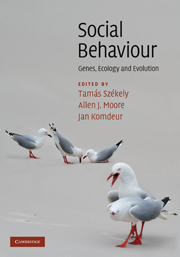Book contents
- Frontmatter
- Contents
- List of contributors
- Introduction: The uphill climb of sociobiology: towards a new synthesis
- Profile: Undiminished passion
- Part I Foundations
- Part II Themes
- 7 Aggression: towards an integration of gene, brain and behaviour
- Profile: From behavioural observations, to genes, to evolution
- 8 Social influences on communication signals: from honesty to exploitation
- Profile: Reputation can make the world go round – or why we are sometimes social
- 9 Important topics in group living
- Profile: A haphazard career
- 10 Sexual behaviour: conflict, cooperation and coevolution
- Profile: In celebration of questions, past, present and future
- 11 Pair bonds and parental behaviour
- Profile: Mating systems and genetic variation
- 12 Adaptations and constraints in the evolution of delayed dispersal: implications for cooperation
- Profile: Selections from a life in social selection
- 13 Social behaviour in microorganisms
- Profile: The de novo evolution of cooperation: an unlikely event
- 14 Social environments, social tactics and their fitness consequences in complex mammalian societies
- Profile: Evolutionary genetics and social behaviour: changed perspectives on sexual coevolution
- 15 Social behaviour in humans
- Profile: Genes and social behaviour: from gene to genome to 1000 genomes
- Part III Implications
- Species index
- Subject index
- References
Profile: Mating systems and genetic variation
Published online by Cambridge University Press: 05 June 2012
- Frontmatter
- Contents
- List of contributors
- Introduction: The uphill climb of sociobiology: towards a new synthesis
- Profile: Undiminished passion
- Part I Foundations
- Part II Themes
- 7 Aggression: towards an integration of gene, brain and behaviour
- Profile: From behavioural observations, to genes, to evolution
- 8 Social influences on communication signals: from honesty to exploitation
- Profile: Reputation can make the world go round – or why we are sometimes social
- 9 Important topics in group living
- Profile: A haphazard career
- 10 Sexual behaviour: conflict, cooperation and coevolution
- Profile: In celebration of questions, past, present and future
- 11 Pair bonds and parental behaviour
- Profile: Mating systems and genetic variation
- 12 Adaptations and constraints in the evolution of delayed dispersal: implications for cooperation
- Profile: Selections from a life in social selection
- 13 Social behaviour in microorganisms
- Profile: The de novo evolution of cooperation: an unlikely event
- 14 Social environments, social tactics and their fitness consequences in complex mammalian societies
- Profile: Evolutionary genetics and social behaviour: changed perspectives on sexual coevolution
- 15 Social behaviour in humans
- Profile: Genes and social behaviour: from gene to genome to 1000 genomes
- Part III Implications
- Species index
- Subject index
- References
Summary
I can't remember a time when I wasn't interested in social behaviour, and I chose a biology degree course where animal behaviour was a key component. Sussex University was an exciting place to be as an undergraduate in the early 1970s when sociobiology was coming to the fore, and I was lucky enough to have John Maynard Smith as my personal tutor. John's enthusiasm for applying evolutionary principles to animal behaviour was an inspiration that I still value today. When I started doing a PhD on moorhens Gallinula chloropus the working title for my thesis was ‘the function of winter flocking in moorhens’ – why animals live in groups was a key issue in the 1970s. It was whilst watching flocks that I noticed birds fighting in front of potential mates. Moorhens cannot be sexed in the field so it was not immediately clear whether it was males fighting for females or vice versa, and I can remember still my surprise and delight when I came back home and looked up the birds' numbers and sizes to discover that it was the smaller females fighting in front of males. It became clear that they were fighting for access to a particular male, and I started to wonder what it was about this male that was worth fighting for.
- Type
- Chapter
- Information
- Social BehaviourGenes, Ecology and Evolution, pp. 302 - 305Publisher: Cambridge University PressPrint publication year: 2010



